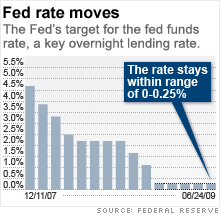Fed not ready to use other R-word: Recovery
Don't look for an overly bullish outlook from central bank, even as more economists see an end to the recession at hand.

NEW YORK (CNNMoney.com) -- Suddenly, it seems, economists everywhere are starting to talk about the end of the recession.
But don't expect the economists at the Federal Reserve to join in that bullish banter when they issue their statement Wednesday at the end of their two-day policy meeting.
"I think we're arriving at the turn," said Mark Zandi, chief economist at Moody's Economy.com. "I think we'll reach it this month, maybe September, but we'll look back and say this is the quarter the recession ended."
But Zandi and other Fed watchers say that central bank policymakers are likely to stay with far more general language about expecting modest growth to return sometime in the second half of this year.
The central bank's policymakers also are virtually certain to leave the key interest rate near zero.
They also are unlikely to give many details about when or how it will start to pull back the roughly $1 trillion expansion of the Fed's balance sheet that it has used to pump money into the economy over the last year.
"I think they're going to be a little more optimistic, but not get too carried away by it," said David Wyss, chief economist for Standard & Poor's. "These are central bankers and they tend to be pessimistic by nature."
"You pull stimulus back when you see all four wheels rolling at the same time," said Kevin Giddis, managing director of fixed income at Morgan Keegan. "We still have something of a traction problem. For the Fed to declare 'game over' is way premature."
Other economists say that even though recent economic readings, such as slowing job losses and rising home prices, have been encouraging, it could cause problems for the Fed be too optimistic in its outlook.
Investors and economists would take that as a sign that higher rates are just around the corner.
That belief in itself could cause the rates on Treasurys to rise.
"That would slow the recovery, not accelerate it," said Lyle Gramley, a former Fed governor and now senior economic adviser for Soleil Securities. "They have to acknowledge it's doing better and turned the corner. But their expectation is for a very mod
However, if the Fed is behind the curve in recognizing the recovery, all the money it has pumped into the economy, along with the low interest rates, can themselves cause problems, such as inflation.
The $1 trillion expansion of Fed activity has included some extraordinary steps.
They include buying Treasurys, mortgage-backed securities and the debt of Fannie Mae and Freddie Mac.
The Fed also expanded its loans, moving beyond the loans to commercial banks to also lend to Wall Street firms.
And it helped finance the operations of major corporations through the purchases of commercial paper. It has also loaned money to firms so they could make auto and other consumer loans.
Fed Chairman Ben Bernanke has insisted the central bank will be able to unwind its position when the time comes. But inflation hawks would like more of a timetable, fearing that maintaining the current activity too long could cause prices to soar down the road.
Wyss said Wednesday's statement could give hints about such an unwinding, but only in the most indirect way.
"They'll have some stuff about credit markets returning to more normal conditions, and perhaps something in there about a gradual unwinding of the special facilities. But there will be no promises or details," said Wyss.
Wyss said the recovery will be in a very fragile state at the start, and that the Fed therefore has to be careful not to get ahead of itself, especially since inflation remains in check.
"Things are looking good now, but we thought they were looking good last summer, too," he said. ![]()

